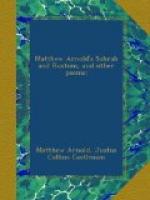“The ferry guard
Now would not row him o’er the lake
again.”
—LANDOR.
=72. Rotha=. A small stream of the English Lake Region, on which Rydal Mount, Wordsworth’s burial-place, is situated.
THE SCHOLAR-GIPSY
“There was very lately a lad in the University of Oxford who was by his poverty forced to leave his studies there and at last to join himself to a company of vagabond gipsies. Among these extravagant people, by the insinuating subtilty of his carriage, he quickly got so much of their love and esteem that they discovered to him their mystery. After he had been a pretty while exercised in the trade, there chanced to ride by a couple of scholars who had formerly been of his acquaintance. They quickly spied out their old friend among the gipsies, and he gave them an account of the necessity which drove him to that kind of life, and told them that the people he went with were not such impostors as they were taken for, but that they had a traditional kind of learning among them, and could do wonders by the power of imagination, their fancy binding that of others; that himself had learned much of their art, and when he had compassed the whole secret, he intended, he said, to leave their company, and give the world an account of what he had learned.”—GLANVIL’S Vanity of Dogmatizing, 1661. [198]
=2. wattled cotes=. Sheepfolds. Probably
suggested by Milton’s
Comus, l. 344:—
“The folded flocks, penned in their wattled cotes.”
=9. Cross and recross=. Infinitives depending upon seen, l. 8.
=13. cruse=. Commonly associated in thought with the story of Elijah and the widow of Zarephath, 1 Kings, xvii: 8-16.
=19. corn=. See note, l. 156, Sohrab and Rustum.
=30. Oxford towers=. “Oxford, the county town of Oxfordshire and the seat of one of the most ancient and celebrated universities in Europe, is situated amid picturesque environs at the confluence of the Cherwell and the Thames (often called in its upper course the Isis). It is surrounded by an amphitheatre of gentle hills, the tops of which command a fine view of the city with its domes and towers.”—BAEDEKER’S Great Britain, in his Handbooks for Travellers. In writing of Oxford, Hawthorne says: “The world, surely, has not another place like Oxford; it is a despair to see such a place and ever to leave it, for it would take a lifetime, and more than one, to comprehend and enjoy it satisfactorily.” See also note, l. 19, Thyrsis.
=31. Glanvil’s book=. See introductory note to poem.
=42. erst=. Formerly. (Obsolete except in poetry.)
=44-50=. See introductory note to poem.
=57. Hurst=. Cumner (or Cumnor) Hurst, one of the Cumnor range of hills, some two or three miles south and west of Oxford, is crowned with a clump of cedars; hence the name “Hurst.”




